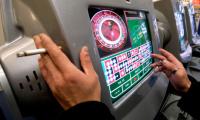 Fixed odds betting terminals (FOBTs) were subject of the anti-gambling types latest 30-minute outburst of ire with the UK’s very own Teflon coated TV Corporation, the BBC, providing the perfect platform. For anyone that missed out on the BBC’s Panorama program last night, the documentary looked at how FOBTs – or the “crack cocaine of gambling” for want of a better phrase – are wreaking havok and turning betting shops into breeding grounds for “crime and disorder”.
Fixed odds betting terminals (FOBTs) were subject of the anti-gambling types latest 30-minute outburst of ire with the UK’s very own Teflon coated TV Corporation, the BBC, providing the perfect platform. For anyone that missed out on the BBC’s Panorama program last night, the documentary looked at how FOBTs – or the “crack cocaine of gambling” for want of a better phrase – are wreaking havok and turning betting shops into breeding grounds for “crime and disorder”.
The BBC spoke to “industry whistleblowers” from William Hill, Ladbrokes and Betfred all of whom seemed in almost complete opposition to the machines. There were stories of people coming down to the shops armed with pick axes to smash up the machines, chairs and stools being used, and even the presence of players frothing at the mouths and wetting themselves whilst sitting at the machines. The program also went undercover and even invented a new name for what people experience when getting pissy with the machines– FOBT rage.
One of the main issues the BBC had was the anti-social behavior in shops and that firms are simply choosing to handle criminal damage in-house without referring it to the police. In light of this we spoke to both Betfred and William Hill earlier today with both reiterating to CalvinAyre.com how seriously they take staff and customer safety in their shops. Betfred added that they will “reiterate to all our staff the policies we have in these very important areas”. William Hill stated: “Where required, we work closely with the police through our own dedicated security department to address crime and disorder issues”.
Looking for another point of view, the interviewer went to Dirk Vennix from the Association of British Bookmakers (ABB). He must be tired of saying this by now but once again he reiterated there being “no empirical evidence linking machines to addiction”. Vennix has in the past also stated that the machines being mentioned have been in shops for ten years and there hasn’t been any “discernable increase in problem gambling levels” whilst welcoming any research that “will deal, once and for all, with some of the myths and more outrageous claims.”
Of course a program attacking gambling wouldn’t be complete without online gambling being apportioned some of the blame. This was no different with the reported explaining that it was even easier for people to fall into the problem gambling category when betting from home.
Gambling firms are already helping the 0.9 percent of the population that are said to have a problem with gambling and William Hill wanted to reiterated that “where there are clear indications of problem gambling we work with funded treatment providers to offer education, and self-help options such as self-exclusion to those affected.”
It’s also interesting to mention that when up against other addictions, shopping as a prime example, the amount of problem gamblers is minuscule. An article on this site back when Channel4’s Dispatches went out in September stated that around 8-16 percent of people are addicted to shopping and Betfari’s Susannah Gill added “I never see anyone make this perfectly rational comparison which to me is necessary in order to underpin the debate on gambling and how to help problem gamblers.”
Largely most of what was here was covered was included in C4’s Dispatches program little over six weeks ago and it’s the usual hyperbole that we’ve come to expect from programs looking at the gambling industry. We already knew that efforts were being made by the companies to combat problem gambline and whilst 0.9 percent is still too much, looking at it in a wider context the gambling industry is merely a branch of the entertainment industry that costs money like everything else. There will be people that have a problem with gambling in the same way there are those that have problems with food, shopping, alcohol and drugs, to name but a few.
